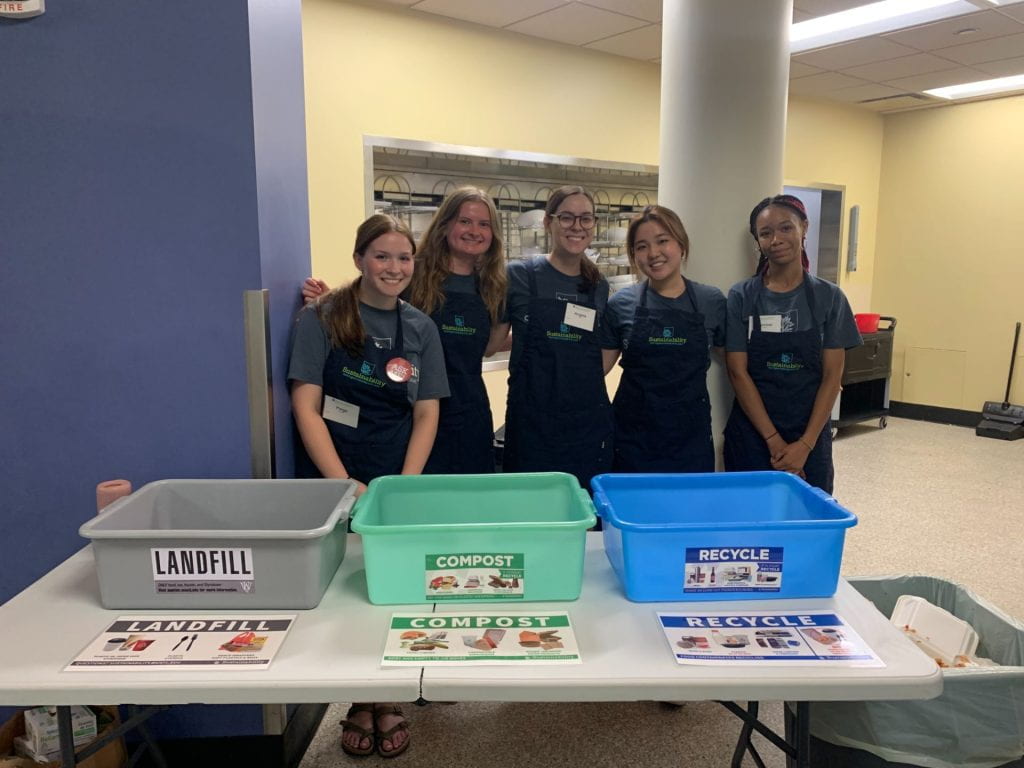There is always a buzz of excitement before Fall Welcome with staff ensuring that everything on campus is just so before welcoming in a new group of students who will spend their most formative years here at WashU.
The Office of Sustainability (OOS) hosted a group of twenty-one upperclassmen (and a law student!) as part of the third SPARK cohort. The SPARK Sustainability Leadership Program pulls together a diverse group of students with a shared interest in campus and community sustainability for nine days of programming and service work. Upon the conclusion of SPARK, many of the students continue engaging as WashU Green Ambassadors (WUGAs).
“The work of SPARK participants (and WUGAs) is important because peer education goes a long way,” reflected Mia Phutrakul, WUGA co-director, Burning Kumquat co-president, and class of 2025. “It’s important for first-year students to see that WashU cares about sustainability in action. Having a WUGA in the dish room tremendously helps students identify where their waste goes especially if they don’t have, for example, composting at home or they don’t know what to look for when recycling.”
Students spent a collective total of 423 service hours over the course of the program. These volunteer hours in service of campus sustainability would not have been possible without the diligent planning of campus partners.
“Many of the service opportunities SPARK participants are plugging into are efforts being led by partners like the Student Transitions & Family Programs (formerly the First Year Center), Campus Life, Residential Life, Dining Services and Campus Mail,” shared Cassandra Hage, assistant director of sustainability. “We are finding that campus partners are building sustainability into their plans – and together we can really set the tone for campus culture.”
The nine-day program also included an overnight retreat; presentations by campus partners and guest speakers; and visits to an urban farm, a workforce training culinary program, and Cahokia Mounds.
After a soft launch last Fall, students supported a number of large-scale Share Our Stuff sales at the Circularity Center, beginning the day first-year students moved in, followed by additional sales timed for the return of upperclassmen. The Share Our Stuff program collects items that students no longer need during move-out and makes these items available to students as they move in.
SPARK students also supported the launch of a new sustainable dining program, ReusePass. While WashU has offered reusable to-go containers for about a decade, this is the first time that an accountability measure has been introduced to track and improve the return rate. SPARK students helped explain the program to other students and get them enrolled.
The SPARK experience culminated in a group dinner on the last day of the program. Participants shared highs and lows of their experience. While the lows overwhelmingly had to do with bug bites and the record heat, highs varied. Some of the highlights included getting to know the other students, exploring previously unknown parts of St. Louis—particularly Cahokia Mounds, and learning about so many different ways to be involved in sustainability.
The students built a strong network of campus and community allies that will continue to serve them as they embark on their high-impact activities during the academic year.
Mia shared their favorite memory from the SPARK experience which happened during the overnight retreat. “[We were] going to the Gravel Bar near the Meramec River. From the hike there, to dipping my toes in the water, to the hike back – the entire time I was surrounded by others who were present in nature and appreciating the beauty. It was very special to be able to share that experience with everyone.”
SPARK applications for next summer will open before the end of the Spring semester.
Further reading:
